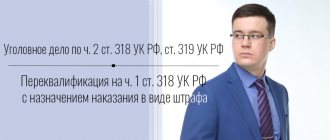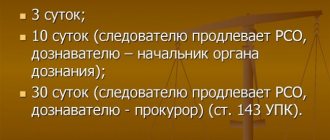Judicial practice under Part 3 of Art. 264 Criminal Code of the Russian Federation
Criminal Code of the Russian Federation
Article 264. Violation of traffic rules and operation of vehicles (as amended by Federal Law No. 20-FZ of February 13, 2009)
1. Violation of traffic rules or operation of vehicles by a person driving a car, tram or other mechanical vehicle, resulting in by negligence causing serious harm to human health, -
shall be punishable by restriction of freedom for a term of up to three years, or forced labor for a term of up to two years, with or without deprivation of the right to hold certain positions or engage in certain activities for a term of up to three years, or by arrest for a term of up to six months, or by imprisonment for a term of up to two years with or without deprivation of the right to hold certain positions or engage in certain activities for a period of up to three years.
(as amended by Federal Laws dated December 27, 2009 N 377-FZ, dated March 7, 2011 N 26-FZ, dated December 7, 2011 N 420-FZ, dated December 31, 2014 N 528-FZ)
2. An act provided for in the first part of this article, which through negligence entailed the infliction of grave harm to a person’s health, if it:
a) committed by a person in a state of intoxication;
b) involves leaving the place where it was committed, -
shall be punishable by forced labor for a term of up to five years with deprivation of the right to hold certain positions or engage in certain activities for a term of up to three years, or imprisonment for a term of three to seven years with deprivation of the right to hold certain positions or engage in certain activities for a term of up to three years.
(as amended by Federal Law dated June 17, 2019 N 146-FZ)
(Part 2 as amended by Federal Law dated April 23, 2019 N 65-FZ)
3. An act provided for in the first part of this article, resulting in the death of a person through negligence, -
shall be punishable by forced labor for a term of up to four years with deprivation of the right to hold certain positions or engage in certain activities for a term of up to three years, or imprisonment for a term of up to five years with deprivation of the right to hold certain positions or engage in certain activities for a term of up to three years.
(as amended by Federal Laws dated December 7, 2011 N 420-FZ, dated December 31, 2014 N 528-FZ)
4. An act provided for in the first part of this article, resulting in the death of a person through negligence, if it:
a) committed by a person in a state of intoxication;
b) involves leaving the place where it was committed, -
shall be punishable by imprisonment for a term of five to twelve years with deprivation of the right to hold certain positions or engage in certain activities for a term of up to three years.
(as amended by Federal Law dated June 17, 2019 N 146-FZ)
(Part 4 as amended by Federal Law dated April 23, 2019 N 65-FZ)
5. An act provided for in the first part of this article, resulting in the death of two or more persons through negligence, -
shall be punishable by forced labor for a term of up to five years with deprivation of the right to hold certain positions or engage in certain activities for a term of up to three years, or imprisonment for a term of up to seven years with deprivation of the right to hold certain positions or engage in certain activities for a term of up to three years.
(as amended by Federal Laws dated December 7, 2011 N 420-FZ, dated December 31, 2014 N 528-FZ)
6. An act provided for in the first part of this article, resulting in the death of two or more persons through negligence, if it:
a) committed by a person in a state of intoxication;
b) involves leaving the place where it was committed, -
shall be punishable by imprisonment for a term of eight to fifteen years with deprivation of the right to hold certain positions or engage in certain activities for a term of up to three years.
(as amended by Federal Law dated June 17, 2019 N 146-FZ)
(Part 6 as amended by Federal Law dated April 23, 2019 N 65-FZ)
Note. No longer in force on July 1, 2015. — Federal Law of December 31, 2014 N 528-FZ.
Notes. 1. In this article and Article 264.1 of this Code, other mechanical vehicles mean tractors, self-propelled road construction and other self-propelled machines, as well as vehicles for which a special right is granted in accordance with the legislation of the Russian Federation on road safety.
2. For the purposes of this article and Articles 263 and 264.1 of this Code, a person who is in a state of intoxication is recognized as a person driving a vehicle if it is established that this person has consumed substances that cause alcoholic intoxication, which is determined by the presence of absolute ethyl alcohol in a concentration exceeding the possible the total measurement error established by the legislation of the Russian Federation on administrative offenses, or in the case of the presence in the body of this person of narcotic drugs, psychotropic substances or their analogues or new potentially dangerous psychoactive substances, as well as a person driving a vehicle who has not complied with the legal requirement of an authorized official about undergoing a medical examination for intoxication in the manner and on the grounds provided for by the legislation of the Russian Federation.
(as amended by Federal Laws dated July 3, 2016 N 328-FZ, dated June 17, 2019 N 146-FZ)
(notes introduced by Federal Law dated December 31, 2014 N 528-FZ)
A criminal case has been opened against me under Part 3 of Art. 264 of the Criminal Code of the Russian Federation, can I avoid a suspended sentence?
Hello! A criminal case has been opened against me under Part 3 of Art. 264 of the Criminal Code of the Russian Federation, can I avoid a suspended sentence?
Lawyer Antonov A.P.
Good afternoon
According to Part 3 of Article 264 of the Criminal Code, violation by a person driving a car, tram or other mechanical vehicle of the rules of the road or the operation of vehicles, resulting in the death of a person through negligence, is punishable by forced labor for up to four years with deprivation of the right to occupy certain positions or engage in certain activities for a term of up to three years, or imprisonment for a term of up to five years with deprivation of the right to hold certain positions or engage in certain activities for a term of up to three years. According to Article 73 of the Criminal Code, if, having imposed correctional labor, restrictions on military service, detention in a disciplinary military unit or imprisonment for a term of up to eight years, the court comes to the conclusion that it is possible to correct the convicted person without actually serving the sentence, it decides to consider the imposed punishment conditional. A suspended sentence is not assigned to: a) those convicted of crimes against the sexual integrity of minors under fourteen years of age; a.1) convicted for crimes provided for in parts one and two of Article 205.1, Article 205.2, part two of Article 205.4, parts one to three of Article 206, Article 360 of this Code; b) when committing a serious or especially serious crime during the probationary period, with a conditional sentence imposed for committing an intentional crime, or during the unserved part of the sentence imposed for committing an intentional crime, with conditional early release; c) in case of a dangerous or especially dangerous relapse. When assigning a suspended sentence, the court takes into account the nature and degree of social danger of the crime committed, the identity of the perpetrator, including mitigating and aggravating circumstances. Probation periods that have not expired on the day of entry into force of Federal Law No. 33-FZ of March 29, 2010 are calculated in the manner established by Article 73 of this Code (as amended by the said Federal Law). When assigning a suspended sentence, the court establishes a probationary period for which the conditionally convicted person must prove his correction by his behavior. In case of imposition of imprisonment for a term of up to one year or a more lenient type of punishment, the probationary period must be no less than six months and no more than three years, and in case of imposition of imprisonment for a term of more than one year - no less than six months and no more than five years . The probationary period is calculated from the moment the sentence enters into legal force. The probationary period includes the time elapsed from the date of pronouncement of the sentence. If a sentence is imposed in the form of detention in a disciplinary military unit, the conditional probationary period is established within the limits of the remaining period of military service on the day the verdict is announced. With a suspended sentence, additional types of punishment may also be imposed. The court, when assigning a suspended sentence, imposes on the suspended sentenced person, taking into account his age, ability to work and state of health, the performance of certain duties: not to change his permanent place of residence, work, study without notifying the specialized government body that monitors the behavior of the suspended sentenced person, not to visit certain places, undergo treatment for alcoholism, drug addiction, substance abuse or a sexually transmitted disease, work (get a job) or continue studying in a general education organization. The court may impose on the conditionally convicted person the performance of other duties that contribute to his correction. Control over the behavior of a conditionally convicted person is carried out by an authorized specialized state body, and in relation to military personnel - by the command of military units and institutions. During the probationary period, the court, on the proposal of the body monitoring the behavior of the conditionally convicted person, may cancel in whole or in part or supplement the duties previously established for the conditionally convicted person. Thus, you can only be assigned forced labor, real or conditional imprisonment.
Sincerely, lawyer Anatoly Antonov, managing partner of the law firm Antonov and Partners.








